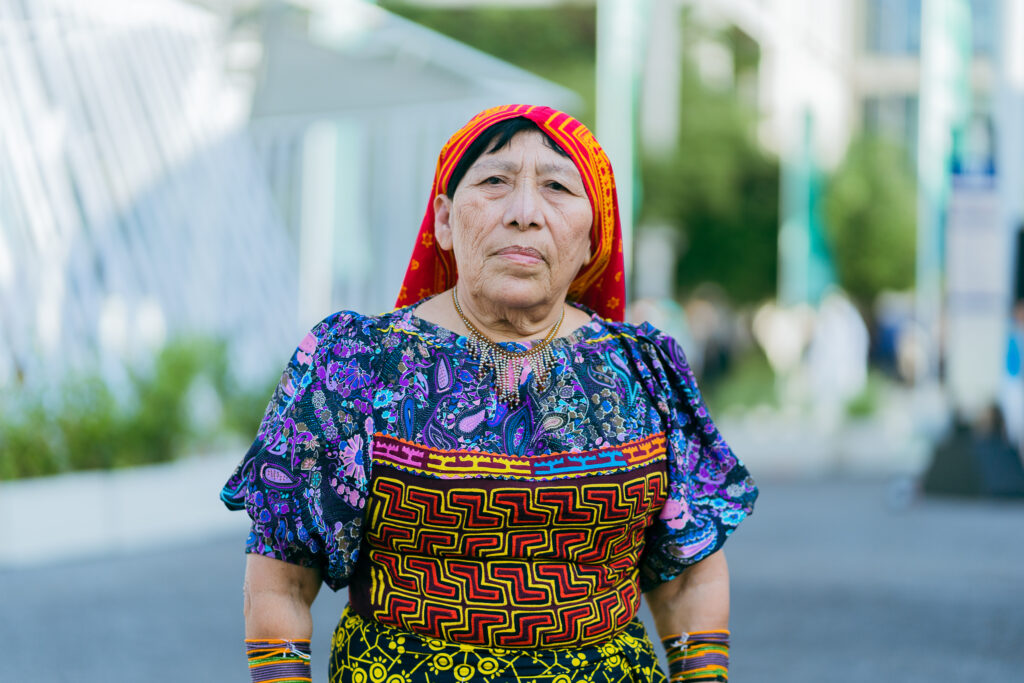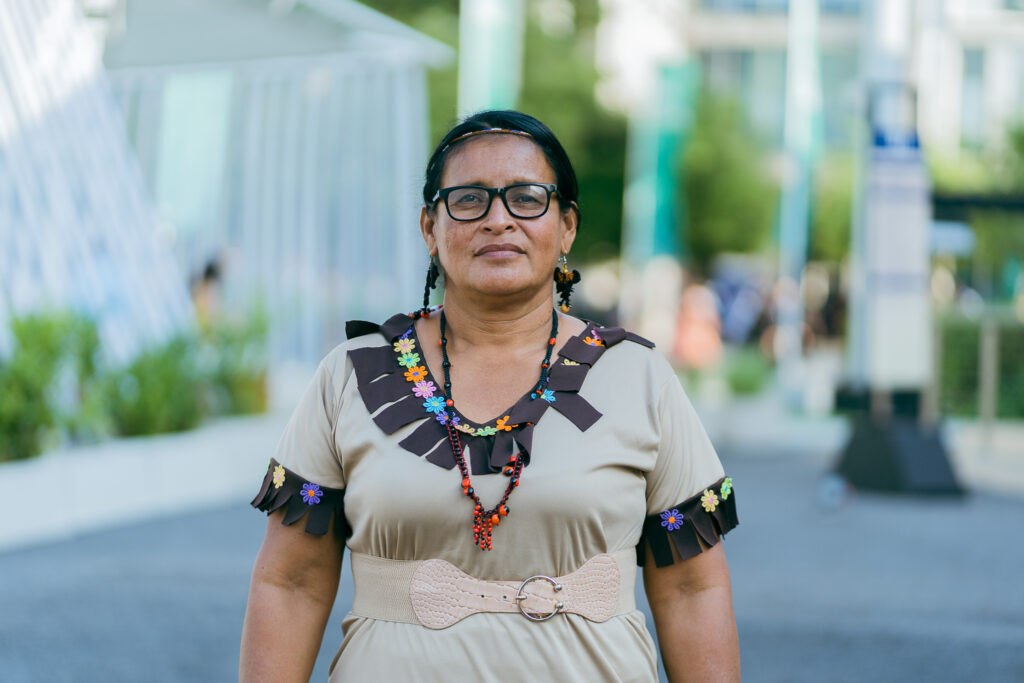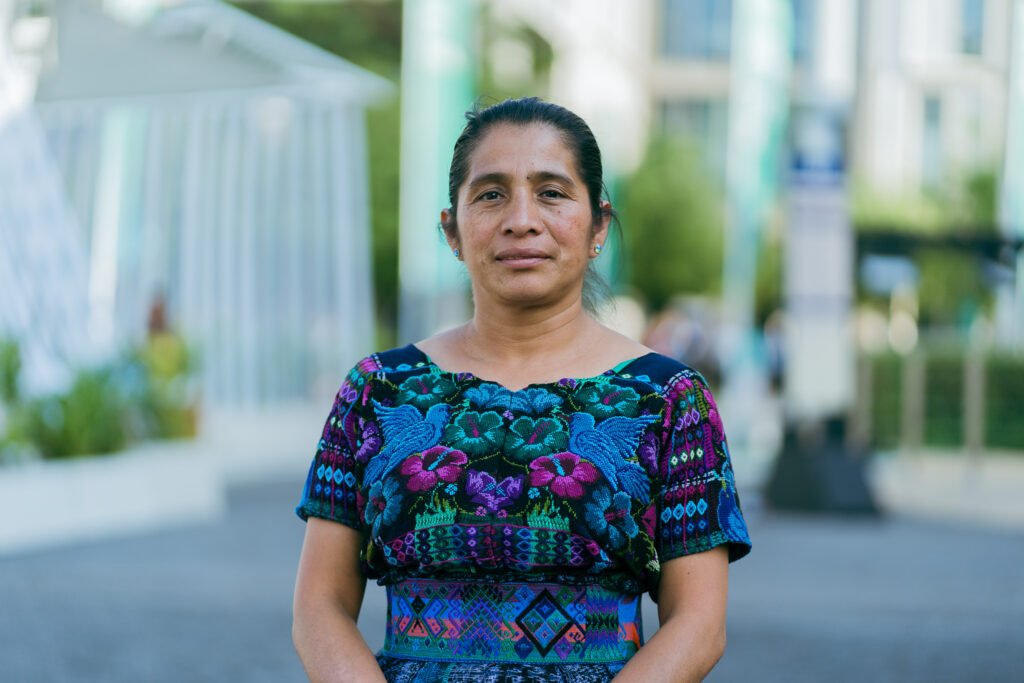Indigenous voices at COP28: “We implore all of humanity to unite with a single objective: to declare, “Enough is enough”
Three members of the Frontline Community Delegation (FCD), Maria Pedro de Pedro, Briseida Iglesias Lopez de Guerrero, and Maricela Fernández Fernández, shed light on the urgent realities faced by those most directly impacted by climate change. Their stories reveal not only the challenges but also the resilience and solutions found within frontline communities.
By Climate Champions | December 10, 2023
Briseida Iglesias Lopez de Guerrero, Founder Panama Bundorgan Women’s Network

My name is Briseida Iglesias Lopez de Guerrero, an Indigenous person from Panama, here to share a crucial message about climate change. In the coastal islands of Panama, Indigenous communities have observed unprecedented changes, particularly with rising tides. Our elders convey messages from the Creator, urging us to wake up and reassess our treatment of Mother Earth. Climate change not only impacts tides but also significantly affects our health.
The foundation of our food, drawn from the Earth, is diminishing, impacting our ability to cultivate and produce nutritious food, resulting in a decline in our overall health. This transformation doesn’t solely affect humans but extends to the entire planet, influencing aspects from health to education and society. Indigenous communities possess solutions, and it is imperative to identify and implement them.
I propose a solution, one that Indigenous peoples have recognized. The key lies in personal responsibility. By altering our internal ecology, examining our thoughts, and understanding the consequences of our actions, we can contribute to the solution. Each person represents a character in the universe, akin to the components of the human body symbolizing elements of nature. By taking care of ourselves, we contribute to caring for Mother Earth and mitigating the effects of climate change.
Secondly, let’s plant the healing tree along the riverbank. It’s time for action, not just talk about technology. Even with support from investors and capitalists, we need individuals knowledgeable about fighting climate change to educate children and communities on planting trees along riverbanks.
When we see a rainbow in sky, Mother Earth is in fullness, and it’s the planting of fruit trees. The whistle of the cicada signifies impending rain. Animal sounds in the sky warn of planting and harvesting times. Everything is in order.
The healing tree grows slowly, with results not immediately visible. We won’t solve anything in two years or even next year. By giving life to a tree, we can change our way of living. It is crucial to fight against climate change ourselves and not solely rely on the government. We are the creators of our own universe, and we must take care of ourselves.
We won’t change a country’s politics; only we can change ourselves. Don’t wait for anyone; we are the ones who must fight to end climate change. Tomorrow’s medicine will be the trees. When you go to the hospital, they tell you to bring a fan—plant a tree in your house. We must unite with a single idea and struggle to awaken the Earth, and then we will see the face of Mother Earth smiling again. If we don’t do that, gradually the world will slip away from us.
Why do I share this? Because there are solutions, and the solution is us—humanity. Wake up, brothers and sisters.
I like to speak in metaphors, as our grandparents say, “If you don’t seek the past, we won’t see the future.” Why didn’t our grandparents cut trees? Because there are sacred trees that sustain life. These trees are habitats for little animals that fly, they are also the children of the Earth. The entire tree cannot be cut; it’s done with time and notice, respecting the natural cycles. Raindrops signal the time for corn planting when Mother Earth is in Yang.
When we see a rainbow in sky, Mother Earth is in fullness, and it’s the planting of fruit trees. The whistle of the cicada signifies impending rain. Animal sounds in the sky warn of planting and harvesting times. Everything is in order.
Though our grandparents were unfamiliar with technology and never spoke Western languages, they imparted a popular education rooted in our Kuna language. They instilled in us a love for the land, respect for Mother Earth, and the importance of living as her custodians.
In the Kuna Yala village, there is no market for sale; we exchange seeds between villages, sharing resources when a brother is in need. This is ancestral memory, a record of the traditions of Indigenous peoples.
We must look to the past and the future because if we don’t, who will learn from the past? The youth. We still have grandparents who possess valuable knowledge. When climate change began, they warned us of the trouble, and in the four cardinal points, animals like the eagle, black panther, and cayena signify the sustaining forces of Mother Earth.
These animals have awakened, as our grandparents said. Storms and disasters are a result of disturbing the harmony of Mother. If we don’t acknowledge the past, the heat and climate change we endure will persist.
Where do vitamins come from? Not just stones but also trees. As Indigenous peoples, we consume directly from nature, solving problems with the gifts of the trees. We, as Indigenous peoples, have made mistakes, but we are also the solution. We won’t blame one person; we’ve all made mistakes. We failed to see our Mother, witnessing the consequences. It’s time to take responsibility, to uplift our Mother as many times as needed. Even if the world hears me, even if the regions hear me, I will say it a thousand times: Wake up, everyone. Let’s find the beautiful face of Mother Earth together because we are her children.
Briseida Iglesias was born in Gunayala on September 2, 1955, of traditional parents. She is a connoisseur of history and ancestral cultures and specializes in the origin of the mola (traditional textile art). She is the founder of the Bundorgan Women’s Network.
Maricela Fernández Fernández, President Costa Rica Kábata Könana Women’s Association

Climate change brings about floods, temperature variations, and unpredictable weather patterns, disrupting traditional production systems and causing significant damages and losses, affecting both large industries and small Indigenous territories alike. In response, Indigenous communities are actively engaged in rescuing native seeds, recovering resistant seeds, and restoring forests to mitigate the impacts of climate change on agriculture and the environment.
Despite the continuous efforts of Indigenous communities to protect and conserve their territories, the actions of big industries persistently contribute to pollution. Indigenous peoples strive to create a healthier environment, recognizing the interconnectedness of nature and the need for collective action. Our message delivered at COP emphasizes the importance of unity, calling on countries, organizations, institutions, Indigenous territories, peoples, NGOs, and individuals worldwide to collaborate and find solutions.
Indigenous peoples, while sometimes not experts in politics or technical structures, are professionals in environmental defense. Our knowledge, passed down by our ancestors, teaches us to live with and respect nature.
Where we live, we cannot deviate a river or disrupt nature because it will return to its course. We cannot play with nature; we must have mutual respect and connection. Indigenous peoples respect the forest, nature, and biodiversity.
We call for a halt to deforestation, an urgent need to address river pollution, and curb mining exploitation. The promotion of biodiversity, protection of native seeds, and adoption of sustainable agricultural practices are crucial components. Food sovereignty, guided by ancestral knowledge, is a key strategy in the face of climate change. We reject transgenic seeds and promote resistant seeds for climate change.
Indigenous peoples, while not experts in politics or technical structures, are professionals in environmental defense.
Women actively contribute to the rescue of agriculture, playing a pivotal role in climate change adaptation, food sovereignty, and the preservation of cultural knowledge and language.
In our territory, we are governed by our plans. It’s a wisdom, an identity that identifies us. All the knowledge and practices in our territory cannot be neglected. We have to improve, rescue, and strengthen this knowledge, which comes from the base. We don’t learn it in schools or universities; we learn it from our knowledge bearers, the elders, the ancestors who have left this knowledge for thousands of years. Safeguarding this knowledge is the best solution to fight climate change.
Maricela Fernández Fernández currently serves as the President of the Kábata Könana Women’s Association, a network of more than 200 families in more than 15 communities focused on economic, social, and environmental development. The Association led the “Weavers of Knowledge” initiative to rescue native seeds and traditional farming practices. Fernández is also the spokesperson of the Association for the Comprehensive Development of the Talamanca Cabecar Indigenous Territory, a representative of the Cabecar Women in the National Forum of Indigenous Women, and a translator for Cabecar women in in the defense of their rights. She led the process of creating COVID 19 community care protocols in her territory. Learn more: https://www.alianzamesoamericana.org/en/kabata-konana-indigenous-womens-association-receives prestigious-equator-prize-from-united-nations/
Maria Pedro de Pedro, Representative Guatemala Association of Eulalense Women for the Development Pixan Lonob’ (Amedpik)

The global consequences of climate change are impacting us at various levels, from entire countries down to local communities. We are witnessing the devastating effects of droughts, wildfires, floods, and other disasters, leading to water scarcity, loss of agricultural activities, and damage to our natural environment.
Specifically, women are disproportionately affected by these changes. We lack access to water for our domestic activities at home, and we can’t engage in our agricultural activities. How can we irrigate when water sources are disappearing due to wildfires, which also harm trees? Landslides during natural disasters not only impact our productive activities but also destroy family gardens crucial for community sustenance. The loss of agricultural production during these events is a pressing concern.
As individuals deeply connected to the Earth, we recognize the urgent need to address the causes of climate change. While half of Mother Earth is protected, the other half faces disobedience from those contributing to environmental degradation. We, as true spokespersons for our communities, are dedicated to protecting our forests, recovering our flora and fauna, and nurturing Mother Earth. Despite our efforts, the actions of others continue to cause harm, affecting not only one community but all of us on Earth.
We extend an invitation to everyone to heed the cry of Mother Earth, who is warming up and burning. We must work together to restore and preserve our planet. As Indigenous peoples, we call for an end to deforestation, river pollution, mining exploitation, monocultures, and harmful industrial projects. Agro-industries are negatively impacting Mother Earth, and we implore all of humanity to unite with a single objective: to declare, “enough is enough.” The consequences of climate change are wreaking havoc on humanity, disrupting our food systems and causing widespread destruction.
Indigenous communities are actively playing their part in protecting and conserving the environment. We serve as the guardians of our surroundings, preserving native seeds that constitute our genuine food systems. Monoculture projects ultimately harm the microorganisms of Mother Earth. Let us join forces to bring about positive change and collectively declare that ‘enough is enough.’
Maria Pedro is an Indigenous leader, who promotes agroecology from within her family, as a producer of vegetables and oyster mushrooms. She is a representative of the Association of Eulalense Women for the Development Pixan Konob’ (AMEDIPK), from where she has been promoting the strengthening of agroecological planting practices based on Maya ancestral knowledge for 15 years. Also, she is part of the Strengthening Community Radio Snuq’ Jolom Konob, with a period of 17 years with ad honorem service. She is the former president of the Community Forestry Association of Guatemala Utz Che’, a civil association formed by community organizations dedicated to the sustainable management of their natural resources and was awarded the Equator Prize by the United Nations Development Programme (UNDP).




